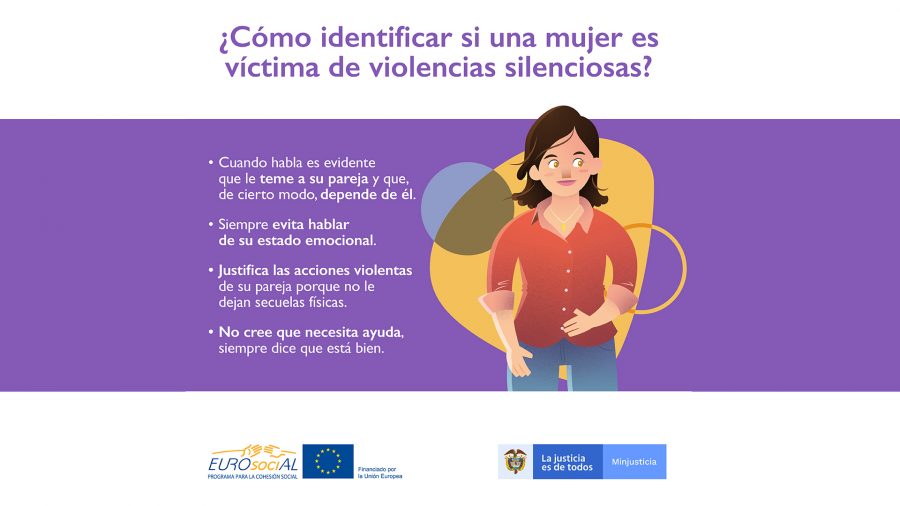The Gender Equality policy area of the EU EUROsociAL+ programme is helping the Colombian Ministry of Justice and Law to design and implement an awareness campaign through social networks to fight this silent problem.

Photo of a post from the Colombian Ministry of Justice Twitter, Facebook and Instagram campaign
During the first COVID-19 lockdown in March 2020, the incidence of domestic violence against women increased by 230% in Colombia. The Observatory on Women Victims of Gender Violence received 3,951 calls between 25 March 2020, the date of the first mandatory national lockdown, and 23 April 2020. This figure is more than 2.5 times the number of calls received the previous year during the same period (1,509 calls). This alarming increase in reports of gender violence in Colombia, which has been especially significant in the most densely populated departments of the country such as Antioquia, Bogotá and Valle del Cauca, shows that the lockdown, far from triggering this phenomenon, has revealed the existence of a significant degree of violence. For thousands of women in Colombia, staying home means suffering from violence that threatens their lives, safety, security and autonomy.
In response to this problem, and in particular to the increase in violence against women, the Congress’s Legal Commission for Women’s Equity reacted quickly by launching the #MujeresSinVirusDeViolence (Women Without the Virus of Violence) campaign during the first half of 2020. One year after this campaign to raise awareness among the Colombian public about the existence of psychological, physical and sexual violence against women, the Colombian Ministry of Justice and Law, with support from the EUROsociAL+ programme’s Gender Equality policy area, has just launched a general awareness campaign to prevent and educate in other less obvious types of violence, namely gender-based psychological, economic and patrimonial violence. This communication campaign is part of the “Strengthening Family Police Stations for Timely Attention to Gender-Based Violence in a COVID context” project.
The campaign, which will last eight months from April 2021, will be divided into two phases:
- First, a series of 66 messages will be posted on the social networks of the Ministry of Justice and EUROsociAL+. It has two objectives:
- – To report on the characteristics, impact and consequences of silence in the lives of women who are victims of violence or at risk. How? Through clear, simple messages that refine the concepts related to silent gender-based violence. By extension, this preventive work aims to promote changes in chauvinistic attitudes in favour of those based on empathy, which allow men to be part of the process.
- – The messages are not only focused on raising awareness and reflection, but also invite citizens to take action to stop this violence.
Eventually, all these messages will be compiled into a single consolidated document that will serve as a guide for Latin American countries wanting to develop or implement an awareness campaign focused on three types of violence:
- – Psychological violence when the woman is exposed to degrading treatment, insults, ridicule, threats and blackmail.
- – Economic violence when the man exercises control over a women’s finances, violating their independence and their life project.
- – Patrimonial violence that occurs when decisions are made about women’s’ assets without their consent, important documents are withheld as blackmail or documents relating to their sons and daughters.
- Secondly, this campaign will be accompanied by the launch of a miniseries of podcasts (four episodes) on the topic to prevent silent violence from becoming normalised in society.
In sum, this project – which invites us to recognise and identify silent violence – is the first step to curbing the problem in a country where 50% of the attacks are predominantly psychological, 28% are physical, 14% economic, 4% patrimonial, 3% sexual and 1% of the violence reported is verbal.[1]
Wilson Ruiz Orejuela, Colombian Minister of Justice and Law
“Violence for reasons of sex and gender can manifest in several ways, all of which are dangerous and have a significant impact, as it violates the fundamental rights and quality of life of those who are at risk or are its victims. Despite its harmful effects, there are certain types of violence that are not fully recognised as such, and which are therefore not reported to the competent authorities so that action can be taken to prevent it from occurring. This is economic, psychological and patrimonial violence, invisible violence which, among other effects, undermines the autonomy, dignity and integrity of those who suffer it, and women are the main victims.
Therefore, in alliance with the EUROsociAL+ Gender Equality policy area, we have designed a communications strategy to raise awareness of the manifestations of economic, psychological and patrimonial violence, promoting social awareness of its existence, zero tolerance and everybody’s responsibility to provide ways of protecting women from its risks or existence. This alliance allows us to promote community introspection and transformation to guarantee a violence-free life for women, creating better conditions for peaceful coexistence based on respect and equality”.
[1] Secretaría Distrital de la Mujer. 2020.



